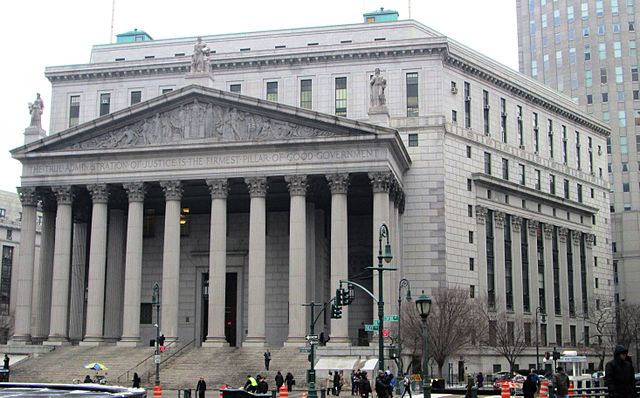
Equal justice for all, whether a top elected official or not, the author writes (photo: Wikimedia Commons)
Alongside the daily coronavirus news come allegations about shocking abuses of power. Several United States senators, most notably Senators Burr and Loeffler, allegedly used non-public information — confidential congressional briefings about COVID-19 — to sell stocks whose prices they believed would drop due to the pandemic. Even worse, while taking steps to profit from the coming pandemic, both assured constituents that there would be no public health or economic crisis. Instead of pushing the president to act sooner, they lulled segments of the public into complacency. This alleged conduct is morally abhorrent and possibly illegal.
But if history is any guide, any prosecution of these senators is likely to proceed far differently from the typical prosecutions of everyday Americans. The coronavirus has laid bare so many stark inequities in our society, like access to health care, economic ability to do social distancing, and even access to coronavirus testing. This crisis is also further revealing terrible truths about the inequities of our criminal justice system — inequities long in need of sweeping reform for the sake of justice, now also more urgently than ever for the sake of public health.
Consider the disparity between what these senators would face in the criminal justice system with what is faced by ordinary people, so many of whom are currently at risk for coronavirus infection because of their unnecessary incarceration.
Based upon my time as a federal prosecutor focused on public corruption, here is likely what will happen next to the senators, if they’re investigated. Federal prosecutors will analyze the stock trades, interview people who attended closed-door briefings with the senators, and subpoena the senators’ financial records. Defense lawyers will have the chance to meet with prosecutors before any charges are brought; they’ll be shown incriminating evidence and given the chance to argue that no charges should be brought. If charges are brought, Senators Burr and Loefller will be permitted to turn themselves in rather than be arrested, the judge will set an affordable bail amount, and they will subsequently enjoy ample process, a speedy trial, and, if found guilty, fair treatment post-conviction.
This process will bear little resemblance to what happens every day to ordinary defendants: quick arrests often followed by little to no investigation, exorbitant bail beyond the defendant’s reach, slow or last-minute disclosure of evidence the prosecutor will use at trial, elusive trial dates adjourned for years, and, if found guilty, abhorrent prison conditions and re-sentencings for technical parole violations.
This situation was dire before the coronavirus. Our country’s incarceration rates are historically high and well out of line with other countries. Our jail and prison population has ballooned by 500% over the last 40 years, and we are home to 5% of the world, but 25% of incarcerated persons. Research demonstrates that these high incarceration rates do not make us safer.
Now, it’s dire from both a criminal justice and public health perspective. People already in custody and those arrested during the pandemic will be at a heightened risk for contracting the coronavirus. Arresting people and taking them to the courthouse involve multiple interactions during which the coronavirus may spread. People in jails are in overcrowded spaces, unable to practice social distancing, and with little or no access to soap.
Advocates, elected officials, and some law enforcement leaders have pointed to immediate steps to shrink the jail and prison populations: halt arrests for low-level offenses; end cash bail (or, in New York’s case, maintain recent bail reforms); stop imprisoning people for technical parole violations; and release incarcerated people at high coronavirus risk because of age or health conditions, whether through clemency or other methods. These measures are critical from a justice perspective: in the current situation, failing to take these measures will be tantamount, for many, to a death sentence. But it’s also a matter of public health and reducing the spread of the virus.
The coronavirus has led to a swift unmasking of many unjust fault lines in our law and society. Just as coronavirus tests should be available to everyone, not just the connected or famous, a criminal justice system that’s compassionate, effective, and fair should be available to everyone, not just those who are wealthy, or who happen to be senators.
***
Alvin Bragg served as Chief Deputy New York State Attorney General and a federal prosecutor in Manhattan. He is a Visiting Professor, Co-Director of the Racial Justice Project at New York Law School, and candidate for Manhattan District Attorney. On Twitter @AlvinBraggNYC.
***
Have an op-ed idea or submission for Gotham Gazette? Email This email address is being protected from spambots. You need JavaScript enabled to view it.




